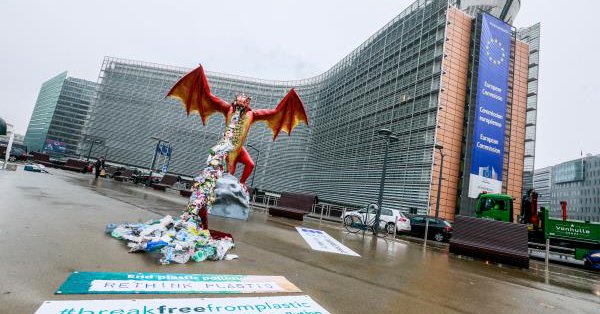Palma (Spain) (EFE).- The ecological organization Greenpeace on Monday released giant models of common plastic items into the sea off the Balearic Islands to raise awareness of the dangers of pollution. Several bottles more than 12 meters (39 feet) long, bottle caps, styrofoam cups, straws and a banner reading #NoPlastic were left bobbing in the sea by the group under the slogan “less plastic, more Mediterranean.” “These objects that we’ve represented break down into smaller, almost indiscernible, pieces that seem harmless but are actually more dangerous for the marine environment,” said the group’s ocean campaign chief, Elvira Jiménez, from the Rainbow Warrior, Greenpeace’s iconic ship. Before any claims of hypocrisy are made, the organization clarified in a statement that the objects they dumped were made out of completely recycled plastic free of phthalates (a carcinogenic group of substances used to make plastic more flexible which have many adverse health effects) and that the items themselves were going to be used many times in other campaigns. According to Greenpeace, approximately 40 percent of the plastic in Europe and Spain is utilized for bottling and packaging, often only for one use. “It’s time to stop the plastic supply and push for re-using and recycling,” said Jimenez, adding: “Responsibility does not just fall on consumers but also on the companies that manufacture and distribute products and the administrations that create laws.”
The European Union is currently revising the guidelines that surround the management of waste and packaging, including plastics, as part of the Circular Economy Strategy. Greenpeace demands that European lawmakers support measures that would reduce single-use plastic and allow European countries to create laws freely on the packaging used in their national markets. It is believed that between 4.8 and 12.7 million tons of plastic end up in the oceans every year. With one piece every four square meters, the Mediterranean Sea has a density of plastic comparable to the so-called “plastic soups” found in the Pacific Ocean. Between 21 and 54 percent of all microplastic fragments are thought to be found in the Mediterranean basin.
More than 1,300 species, including fish, birds, sharks, sea turtles and cetaceans, have been affected by marine garbage. sll/jcm/jt
Photo: A handout photo made available by Greenpeace on June 12, 2017 shows Greenpeace action against the sea contamination in the waters of Balearic Islands, eastern Spain. EPA/PEDRO ARMESTRE /GREENPEACE


